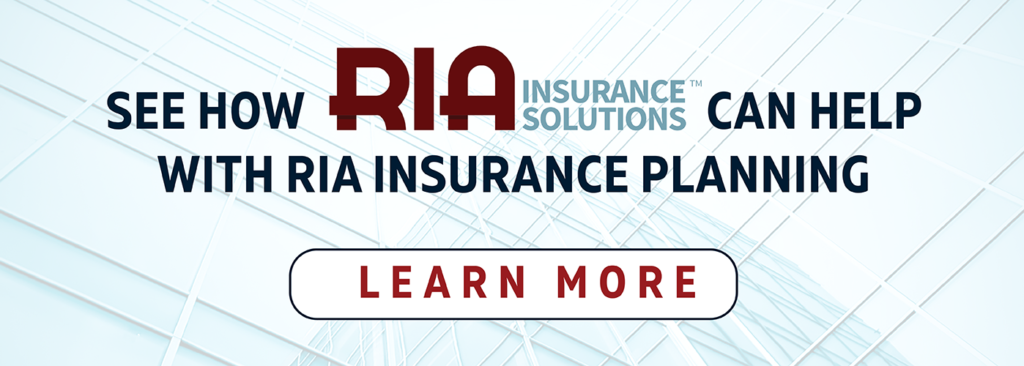Updated February 22, 2024, at 3:19 PM
RIA insurance offerings have grown in recent years as more and more financial professionals move toward the RIA business model.
It’s only natural, too. The progression towards firm independence, customization, and the ability to focus on client-centric solutions attracts many financial professionals.
As the RIA space continues to grow and consolidate, there’s been a shift toward RIAs offering insurance as the industry evolves.
Clients expect more for the fees they pay. RIA insurance offerings help deliver a comprehensive financial plan that can add firm value and give clients more for the advisory fees they pay. Insurance is the only product that offers lifetime retirement income, death benefit guarantees, tax deferral in the accumulation phase, and potential for tax-free wealth transfer.
Implementing RIA Insurance Offerings & Solutions
For RIAs, implementing the insurance portion of a client’s financial plan can be tricky. Maintaining fiduciary standards, licensing, product research and availability, and technology integration tends to make it more complicated to apply insurance solutions.
At the same time, options for clients have grown, with online financial management becoming more mainstream. If technology seems convenient and a retail client doesn’t find enough value in the fees they pay to an investment adviser representative (IAR), there’s a higher chance they’ll go the way of self-management.
The pressure to evolve is mounting, and fee-based and fee-only advisers are working to find new ways to build and diversify their practice while deepening client relationships.
What Does it Mean to be a Fiduciary and Offer Insurance?
IARs are well aware of the fiduciary responsibilities set forth by the Securities and Exchange Commission (SEC). First and foremost, as a fiduciary, you owe a higher commitment to your clients. You know to act in a client’s best interest and abstain from any activity that could conflict with their interests. Whether it’s investment planning, financial planning, or insurance recommendations, you as the IAR must practice this level of service across all areas of advice.
Accordingly, due diligence requires document research and analysis that provides the basis for recommendations. For example: When reviewing life insurance, comparing policy illustrations is only one component of the required due diligence. Someone on your team should check and compare detailed expense pages showing the annual cost of insurance, policy charges, investment choices, and more.
Likewise, when annuities are a good fit within a plan, it’s essential to look at various product solutions, including low- or no-fee alternatives. A thorough analysis would also compare competitive crediting strategies and income options.
Related: Life Insurance as Part of a Retirement Plan
Another popular form of insurance that clients are asking for is long-term care (LTC). When creating an LTC plan, a comparative analysis of LTC options would include examining different solutions and how those solutions could affect a plan. Like life insurance, the LTC policy should consider health, age, cash flow, and family dynamics. Research and analysis supporting any recommendation at this level takes expertise and can be time-consuming.
As a fiduciary, the basis of your analyses and suggestions may include the type of compensation or fee, and you should be comfortable explaining recommendations of commission versus fee-based products.
What About Form ADV?
If you’re considering offering insurance as an RIA, you’ll also want to be transparent if you plan to market yourself as a fee-only adviser. This will require disclosures regarding conflicts of interest on your firm’s 2A form and added disclosures for supplemental brochure 2B.
Your compliance team can help guide you with the word of any conflicts of interest and outside compensation.
RIA Insurance: Considerations to Get Started
Maybe you’ve never sold insurance. Perhaps it’s been a while, or you’ve dropped your insurance licenses along the way to becoming an RIA.
Fear not. There are still ways to offer insurance as an RIA in-house. Here are five practical considerations to know.
#1: Are You Licensed for Insurance?
It’s not uncommon for advisers like yourself to drop their FINRA and insurance licenses as you turn towards the RIA channel—if you ever had them in the first place. So, what’s your current situation?
Some maintained insurance licenses and are dually registered as an IAR and a broker-dealer representative. Known as “hybrid advisers,” dually registered IARs can keep their commission-based business. Through their broker-dealer, hybrid advisers may already have access to vetted products (plus administrative support). Is this you or what you envision becoming?
Benefits of Working With an IMO
If you’re insurance licensed, you may have access to some carriers. However, most carriers don’t market directly. So if you’re interested in a competitive review of products, you may want to consider partnering with an insurance marketing organization (IMO). The advantage of having an IMO in your corner is that it’s easier to run your business efficiently.
The best IMOs will offer:
- Carrier and product vetting
- Free illustrations and insurance policy reviews
- Product fee, expense, and rider comparisons
- Excellent case management
- Licensing support and underwriting negotiation
If you want to be fee-only, you may want to pass off the insurance implementation part of a plan to a licensed professional to make the sale. But by doing so, you may feel like you lose control of your financial and product strategies. You may even find yourself in direct competition for planning advice.
Non-Licensed Fee-Only IARs
For non-licensed, fee-only IARs, it may be rewarding to directly partner with a sales desk that can collaborate with you and do the due diligence of product research, analysis, and if necessary, serve as an agent of record.
Doing so allows you to keep financial advice in-house and retain control of the ever-important client experience.
Related: Life Insurance Policy Reviews for Clients [CAR Program Overview]
#2: Navigating Insurance Products as an RIA
Insurance carriers are evolving to cater to the fee-only adviser and meet the demands of clients for fee-transparent products. Fee-only fixed indexed annuities (FIAs) are one of these newer evolutions.
With optional or built-in guaranteed lifetime withdrawal benefit riders, death benefit guarantees, and some (but usually limited) investment options.
Fee-based annuities’ popularity alone can be an excellent reason to offer insurance in your firm through your own license or an RIA insurance partner. It’s a partial solution to implement risk management into a client’s financial plan.
Life insurance, care planning, and disability strategies may also be necessary. Unless you’re selling insurance regularly and spend hours researching carriers and product offerings, the product universe can be overwhelming. Not to mention, dealing with the underwriting application process and case management issues isn’t a fan favorite.
If you don’t have an RIA insurance partner, ensure you have the time or the right staff members to research and compare fees, riders, and carriers to confirm you’re providing the best options to your clientele.
#3 Interpreting Clients’ Current Insurance
Executing a comprehensive financial plan starts with having all the information you can get. Meet with your clients and have them bring all their financial and insurance documents to the table to see if any changes may be beneficial.
Clients may have annuities with income or death benefit riders that are no longer relevant or old life insurance policies that you can significantly improve. Having a partner that offers in-depth life insurance policy reviews like that in the Comprehensive Analysis and Review program can make these tasks much more manageable.
Remember, clients love having unbiased professional reviews to confirm their in-force policies are still meeting their goals. If you aren’t qualified or don’t have the time to do these analyses, it’s essential to partner with a company that offers them.
#4: The Need for Advanced Markets Support
Concept evaluation and case design are essential when complex dynamics are at play. When offering insurance as an RIA, it’s crucial to have expertise in advanced markets and financial planning techniques. Support is often needed when dealing with estate and care planning, tax-advantaged strategies, wealth management, and retirement planning.
A network of liability insurance agents, health insurance agents, accountants, and attorneys is part of building a comprehensive financial services team. However, finding the right product solutions will still be up to you.
Many direct carriers have advanced markets departments that can give unbiased advice, but they still generally recommend their products. Part of choosing the best IMO for you is to find one that offers advanced case design and product-agnostic advice.
Related: 5 Reasons to Use a Wealth Management Fintech Platform
#5: Technology & Back-Office Support
Technology and real-time data aggregation can be crucial in reporting on a client’s entire portfolio. Fully understanding their holdings lets you see all components at work and whether their goals can be achievable.
Data integration into platforms like the Depository Trust & Clearing Corporation, Morningstar, Envestnet, and MoneyGuidePro are lightyears ahead of mailed statements and manual entries into holdings.
In your move to independence, you may lose layers of back-office support that some broker-dealers offer. Because of this, you may face time-consuming and frustrating processes for applications and follow-up case management. Having the right staff or strategic partner on board would be best for your long-term success.
Get the Right Support With RIA Insurance Solutions
RIA Insurance Solutions is a Financial Independence Group Family Company that partners with RIAs like yours that are looking for life insurance, annuity, and care planning solutions.
RIA Insurance Solutions is a full-service partner for institutions like yours in mind to aid in implementing insurance strategies and solutions. Our systemized programs and flexible models provide cost-effective efficiencies to your RIA, resulting in a seamless integration in your practice and a smooth and managed experience for your clients.
Here are just a few reasons why you need RIA Insurance Solutions:
- Unmatched asset protection strategies and expertise
- Access to fee-based solutions and over 80 carriers
- Control of your clients’ retirement portfolios
- Turnkey and comprehensive policy reviews
- A full-service client application process
For Financial Professional Use Only – Not for Customer Use
The content within this document is for educational purposes only and does not constitute legal, tax or investment advice. Customers should consult their tax or legal professional regarding their own unique situation. Annuity products and their related features, benefits, and/or guarantees are backed by the claims paying ability of an insurance company. FIA features, benefits, guarantees, crediting rates, indexing methods, caps and/or spreads vary by product and insurance company. Customers should review all product information prior to purchase.
Variable insurance company products are both securities products and insurance products. Therefore, Financial Professionals are required to hold state specific insurance licenses (Insurance Producer for Variable Life and Variable Annuities) and FINRA specific registrations (Series 6 or 7, and 63) in order to make recommendations on variable insurance company products.



